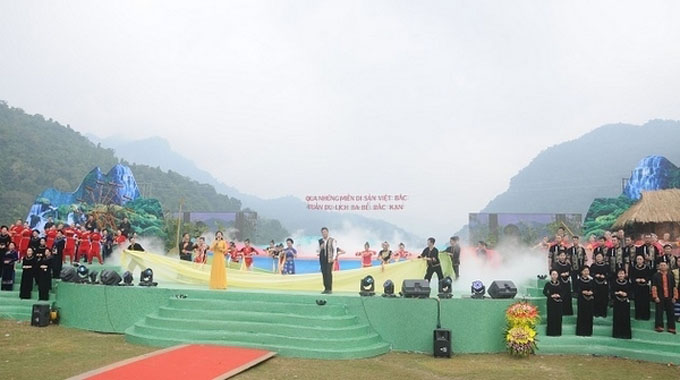A ceremony was held at Ba Be Lake in the mountainous northern province of Bac Kan on November 18, to open the ninth tourism programme entitled ‘Through Viet Bac Heritage Sites’ and Ba Be – Bac Kan tourism week.

At the opening ceremony for the programme ‘Through Viet Bac Heritage Sites’ and Ba Be – Bac Kan tourism week
The annual programme aims to introduce the land, people, culture and tourism potential of six provinces in Viet Bac region, including Cao Bang, Bac Kan, Ha Giang, Tuyen Quang, Lang Son and Thai Nguyen.
Speaking at the opening ceremony, Deputy Minister of Culture, Sports and Tourism Dang Thi Bich Lien said that the programme is a meaningful event to promote the values of the historical and cultural relic sites and landscapes in the region.
The event also contributes to enhancing the cooperation and exchange among the regional localities to build unique tourism products in order to attract more domestic and foreign investors and visitors, gradually turning the tourism sector into a spearhead economic sector.
The main activities during the programme and the Ba Be – Bac Kan tourism week include: cultural and arts exchange performances, a folk arts festival, a show of traditional costumes from the ethnic minority groups in the six provinces, and a photo exhibition on the tourist sites and people of Viet Bac localities. They will be held in Bo Lu village, Nam Mau commune, Ba Be district.
The programme will also feature a wide variety of other activities, including tourism activities at Ba Be Lake; a display of books, newspapers, paintings and photos of the land and people of Bac Kan provinces; screening of films on the Viet Bac region; and pavilions to introduce the typical products from the localities.
At the opening ceremony, more than 1,000 actors, actresses and artisans from six localities in Viet Bac region gave performances of folk songs and dances praising the Party and President Ho Chi Minh, as well as reproducing festivals and cultural identities of each locality in the region.